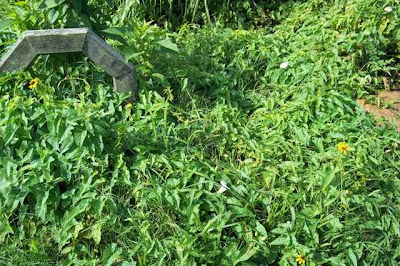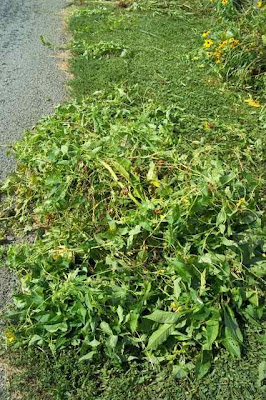Editing Mode
I have been in editing mode lately, not only for some of my own stuff, but also for an anthology my writers group is doing and for a friend's ebook. Because of that—and my difficulty in walking lately—I hadn't gotten much exercise for weeks.
Today, however, I figured I could do a bit of yard work that didn't involve much walking. I could stand and pull weeds, or maybe do a bit of weed-eating. Somehow, a long-neglected flower bed reminded me of the need for editing.
Hints for self-editing: No matter how great you think it is, your first draft isn't the final draft. Stand back and take a good look at it.
Today, however, I figured I could do a bit of yard work that didn't involve much walking. I could stand and pull weeds, or maybe do a bit of weed-eating. Somehow, a long-neglected flower bed reminded me of the need for editing.
Hints for self-editing: No matter how great you think it is, your first draft isn't the final draft. Stand back and take a good look at it.
It probably has a lot of extra words, way too much description, indefinite characters (Yeah, you know them—but will your reader?), some murky parts of the plot, etc. The important stuff might be obscured by all sorts of distractions.
Time to start cutting! Let's get rid of all those excess weeds words—your overuse of adjectives and adverbs, the places where you took a time-out to stop and describe a character's motivations. Or maybe it was the quaint little village where the character stopped on the way to something more important—well, you get the idea. Start cutting!
Once you've gotten rid of some of the excess, take a look at your manuscript.
See? Some of the important things—maybe a character or a theme—are now more obvious. Not great yet, but at least you can see them.
Edit some more. Be ruthless!
Sometimes you need some big editing tools to get the job done.
As you continue to edit, more of your important stuff should start to emerge—something essential to the plot, maybe, or some minor characters.
As you edit, do not lose sight of your whole idea . . .
. . . but don't forget that details are important.
Sometimes you have to stand back and look at the big picture. Do all the details work?
Are there other characters or details you need to reveal?
Before long, you should be able to see the light at the end of the tunnel—or maybe a solar light in a wooden basket.
It will take time to finish editing. It's not a one-day job.
But at least you should be able to see where your work is going.
~















0 Comments:
Post a Comment
<< Home